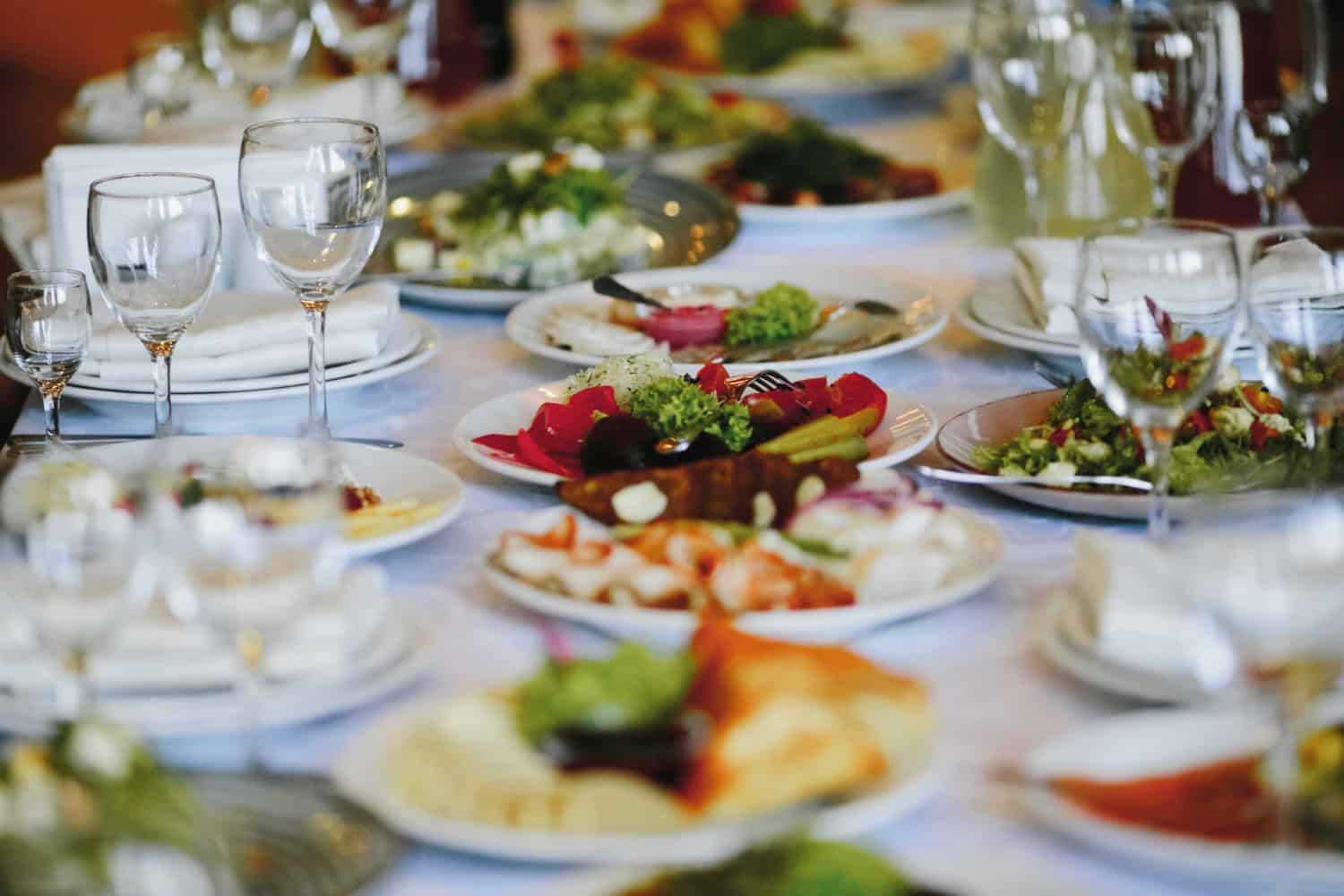
By Jermaine Thomas April 25, 2025
The food landscape has changed dramatically in recent years. With more people embracing specialized diets for health, religious, ethical, or lifestyle reasons, chefs and event planners face the exciting challenge of creating menus that are inclusive, flavorful, and satisfying. Whether it’s a wedding, corporate luncheon, or private gathering, the demand for specialized diet catering is at an all-time high.
Gone are the days when gluten-free, dairy-free, or keto options were bland afterthoughts. Today’s catering professionals know that dietary needs can be met without compromising taste or creativity.
The Rise of Specialized Diet Catering
Catering is no longer just about feeding a crowd. It’s about curating an experience that respects preferences, honors traditions, and celebrates food diversity.
In this section, we explore what specialized diet catering means today and why it matters.
Understanding Dietary Diversity
From low-carb lifestyles to strict religious observances, modern guests bring a wide range of dietary expectations to the table. Vegetarian, vegan, keto, gluten-free, halal, kosher, paleo, and allergen-aware requests are now commonplace.
For caterers, this means more than checking boxes. It requires a deep understanding of ingredients, cross-contamination risks, and preparation methods.
The Benefits of Inclusive Menus
When guests feel their needs are respected, they feel more comfortable and welcome. Offering specialized diet catering not only meets their expectations but elevates the entire event experience. It also reduces the need for last-minute adjustments or awkward conversations.
Moreover, catering for dietary preferences shows that you care about the health, culture, and beliefs of your audience.

Crafting Keto-Friendly Event Food
Keto is one of the most talked-about diets in recent years. Popular for weight loss and blood sugar management, the ketogenic diet is all about low carbs, moderate protein, and high fats.
Here’s how to build keto event food that’s both flavorful and event-appropriate.
Key Principles of Keto
Keto-friendly foods avoid sugars, grains, and starches. Instead, they emphasize proteins like meat and fish, healthy fats like avocado and olive oil, and low-carb vegetables such as leafy greens, zucchini, and cauliflower.
For caterers, understanding these restrictions is the first step in designing satisfying keto dishes.
Creative Keto Event Food Ideas
Forget plain chicken breast and salad. Great keto event food can be rich and memorable. Think cauliflower risotto with herb-roasted salmon, mini avocado deviled eggs, or zucchini noodle bowls topped with pesto and grilled chicken.
Even desserts can shine. Sugar-free cheesecake bites or dark chocolate avocado mousse offer indulgence without breaking the keto code.
Presentation Matters
Keto doesn’t mean boring. Serve dishes in elegant glassware, use edible flowers, or incorporate layered textures for visual appeal. Your keto guests won’t feel like they’re missing out when the food looks as good as it tastes.
Including these options as part of your broader specialized diet catering strategy shows that you value everyone’s experience at the table.
Kosher Catering Done Right
For Jewish guests, following kosher dietary laws is a matter of faith and tradition. Providing kosher menu ideas that adhere to religious standards while delivering culinary delight is a mark of a skilled caterer.
Let’s look at what kosher involves and how to get it right.
What Makes a Meal Kosher?
Kosher guidelines come from Jewish law. They include rules about permitted animals (no pork or shellfish), proper slaughter methods, and not mixing dairy with meat. Certain utensils and equipment must be used only for kosher preparation.
To meet kosher standards, many events work with certified kosher kitchens or catering services under rabbinical supervision.
Kosher Menu Ideas with Flair
Delicious kosher menu ideas don’t need to feel limited. Consider dishes like herb-crusted lamb chops, roasted vegetable platters with tahini drizzle, or grilled salmon with citrus glaze.
For dairy-focused meals, offer spreads like smoked salmon with bagels and non-dairy cream cheese, or savory mushroom quiche with a fresh Israeli salad.
Desserts are another opportunity. Parve (non-dairy) pastries like chocolate babka, almond cake, or fruit sorbet offer sweet endings without dairy conflicts.
Celebrating Culture Through Cuisine
Kosher meals can be deeply flavorful and symbolic. Highlight traditional Jewish dishes like matzo ball soup, kugel, or brisket, and present them with modern flair. Guests—whether kosher or not—will appreciate the cultural depth and thoughtful execution.
Working kosher options into your specialized diet catering menu also shows inclusivity, making guests feel seen and respected.
Serving Multiple Diets at One Event
It’s one thing to plan for a single dietary need. It’s another to juggle multiple. But with good communication and planning, you can offer a smooth experience for all.
Here’s how to accommodate various diets without creating confusion or chaos.
Menu Planning Strategies
Start by asking clients or guests in advance about dietary needs. This helps avoid surprises and allows the kitchen to prepare accordingly.
Create a base menu with options that naturally meet multiple requirements. A vegan quinoa salad can also be gluten-free. A grilled vegetable platter with olive oil suits both keto and paleo eaters.
Design your specialized diet catering menu with layers. Include dishes that serve as standalone meals and others that guests can customize with sauces or add-ons.
Clear Labeling and Communication
Use signage to indicate which dishes meet which dietary needs. Labels like “Vegan,” “Gluten-Free,” “Kosher Certified,” or “Keto-Friendly” can prevent confusion and build trust.
In buffets or stations, have servers who are knowledgeable about ingredients and able to answer questions.
This level of clarity is especially appreciated by those with food allergies or religious restrictions.
Avoiding Cross-Contamination
Especially in kosher and allergen-sensitive cases, cross-contamination is a serious concern. Prepare different diet items in separate areas when possible. Use distinct utensils and cutting boards, and store ingredients in clearly labeled containers.
For events requiring high dietary integrity, working with certified kitchens or trained staff is essential. This attention to detail reflects professionalism and respect.
Elevating Flavor Without Compromise
One myth that still lingers is that dietary-friendly food lacks flavor. In reality, some of the most delicious dishes emerge from thoughtful limitations.
Here’s how to keep meals exciting and delicious across any diet.
Use Fresh, High-Quality Ingredients
When meals rely on fewer ingredients—like in keto event food or vegan dishes—those ingredients need to shine. Use farm-fresh produce, high-quality oils, and well-sourced proteins.
Fresh herbs, spices, and citrus zest can add complexity and brightness to even the simplest recipes.
Focus on Technique
Roasting, braising, fermenting, and searing are all methods that elevate texture and taste. Cauliflower becomes more interesting when roasted with paprika and garlic. Mushrooms develop depth when slow-cooked with onions and thyme.
Mastering these techniques helps any specialized diet catering menu feel gourmet.
Think Globally
International cuisines often align naturally with dietary preferences. Middle Eastern mezze are often vegetarian or kosher-friendly. Southeast Asian dishes can be dairy-free and full of spice. Mediterranean diets offer inspiration for keto or paleo dishes.
Pulling global flavors into your menus keeps things exciting while meeting dietary needs authentically.
The Business Case for Dietary Inclusion
Meeting dietary needs isn’t just about hospitality—it’s also good for business. Catering companies that adapt quickly and creatively to new food trends often earn loyal clients and stand out in a crowded market.
Let’s explore how specialized diet catering can boost your brand.
Expanding Your Client Base
By offering vegan, kosher, keto, or gluten-free options, you open your business to a wider audience. Corporate clients, religious communities, health-conscious families, and wellness events are all seeking inclusive food providers.
Promoting your expertise in keto event food or kosher menu ideas sets you apart from competitors who offer limited flexibility.
Positive Word of Mouth
Guests who feel valued are more likely to spread the word. A guest who finds a delicious keto dessert or a beautifully prepared kosher entrée will remember your service and share their experience.
Word-of-mouth referrals are especially powerful in tight-knit dietary communities.
Long-Term Reputation Building
Being known for quality and inclusivity builds long-term trust. Clients will turn to your business not just for great food but for reliability and adaptability.
This reputation helps secure repeat business, larger contracts, and a place in the growing world of wellness-focused events.

Working With Clients on Dietary Needs
Caterers don’t need to guess what guests want. A good client relationship is built on clear communication.
Here’s how to collaborate with clients to create dietary-aware, memorable menus.
Ask the Right Questions Early
During your first planning meeting, ask about guest dietary preferences, restrictions, and religious considerations. Clarify whether separate stations are needed and if the event will include a mix of diets.
These conversations set expectations and allow you to propose creative solutions in advance.
Offer Sample Menus
Prepare sample menus featuring a mix of keto event food, kosher menu ideas, and other specialty dishes. This helps clients visualize the experience and gives them confidence in your ability to deliver.
Tasting sessions can also reassure clients about flavor, quality, and presentation.
Stay Flexible and Responsive
Sometimes, dietary needs change closer to the event. Be open to making small adjustments and have backup options ready.
Being flexible shows clients that you’re committed to a successful event and capable of handling unexpected challenges gracefully.
Conclusion
Specialized diets are no longer the exception—they’re part of the norm. Whether you’re serving keto event food, building a menu with kosher menu ideas, or offering general specialized diet catering, the goal is the same: great food that brings people together.
Creating inclusive menus isn’t about sacrifice. It’s about celebrating food in all its diversity, getting creative with ingredients, and showing guests that they’re valued. By learning the rules, embracing bold flavors, and planning with care, caterers and hosts can serve incredible meals that honor both preference and tradition.